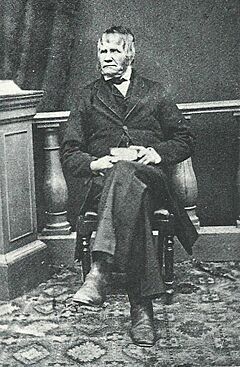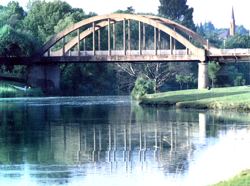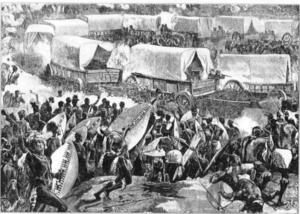Sarel Cilliers facts for kids
Quick facts for kids
Sarel Cilliers
|
|
|---|---|
 |
|
| Personal details | |
| Born |
Charl Arnoldus Cilliers
7 September 1801 Schoongezicht farm, Paarl, Cape Colony |
| Died | 4 October 1871 (aged 70) Doornkloof farm, Lindley, Orange Free State |
| Resting place | Doornkloof farm 27°43′36″S 27°41′53″E / 27.72667°S 27.69806°E |
| Spouses | Anna Francina Viljoen (1801–1851), Aletta Elizabeth Loots (1821–1906) |
| Parents | Carel Cilliers, Elizabeth Catherine Louw |
| Residence | Doornkloof |
| Occupation | Spiritual leader/Preacher, later a church elder and Councillor |
| Military service | |
| Allegiance | |
| Commands | Transvaal and Orange River Commandos |
| Battles/wars | Battle of Blood River Vegkop |
Charl (Sarel) Arnoldus Cilliers (born September 7, 1801 – died October 4, 1871) was an important Voortrekker leader and a preacher in South Africa. The Voortrekkers were Dutch-speaking settlers who moved inland from the Cape Colony in the 1830s.
Sarel Cilliers is famous for leading the Voortrekkers in a special promise, or "vow," to God. This happened before a big battle against the Zulus in 1838, known as the Battle of Blood River. The Voortrekkers promised that if God helped them win, they would build a church and remember that day every year as a special holiday.
He was a very religious man and a key member of the Gereformeerde Kerk (Reformed Church). He joined the Great Trek when he was 35 years old. The town of Kroonstad is said to be named after his horse, Kroon, which drowned in a nearby stream. Today, you can find a museum and a statue of Sarel Cilliers in Kroonstad, and many streets across South Africa are named after him.
Contents
Early Life and Family
Sarel Cilliers was born on September 7, 1801, on a farm called Schoongezicht in the Cape Colony. He was the fourth of seven children born to Carel Cilliers and Elizabeth Catherine Louw. When Sarel was five, his parents sold their farm.
From a young age, Sarel learned about farm life. He also grew up with a strong sense of community and religious duty. On Sundays, neighbors would gather for church services. It was during his childhood that Sarel's strong religious beliefs began. He was said to have had a special experience with God when he was just 10 years old. He often shared his faith with other children, encouraging them to worship and grow closer to God.
On October 6, 1823, Sarel Cilliers married Anna Francina Viljoen. They had eleven children together. Anna passed away on February 26, 1851, and was buried on the Doornkloofopstal Farm. Later, on May 15, 1854, Sarel married his second wife, Aletta Elizabeth Loots. They had one child, Pieter Jacobus Willem Cilliers, born in 1857.
The Great Trek and Spiritual Leadership
In 1829, Sarel Cilliers and his family moved to New Hantam, which is now Colesberg. In 1835, a severe drought hit the area. This led Sarel to join the Great Trek in 1836 with his wife and six children. He believed it was God's will for him to go.
During the Great Trek, Cilliers became the unofficial pastor. He held daily services and gave Holy Communion on Sundays. He became known as a powerful spiritual leader, earning names like The Prophet of the Great Trek. In 1837, he was chosen as one of the first deacons for the church council of the Voortrekker groups.
Sarel Cilliers was known for his ability to encourage and inspire the Voortrekkers during difficult times. He often recited the Lord's Prayer to boost their spirits during conflicts. His leadership was especially important at the Battle of Blood River. There, he spoke the famous vow to God on the battlefield. After their victory, he led a special thanksgiving service. This vow is still remembered today as a national holiday in South Africa, called Day of the Vow, celebrated on December 16.
The Vow of Blood River
The exact words of the vow Sarel Cilliers spoke are not known for sure. The version we have today was put together later based on historical records. It shows the deep faith of the Voortrekkers and their promise to God.
Here is the English version of the vow: Here we stand before the holy God of heaven and earth, to make a vow to Him that, if He will protect us and give our enemy into our hand, we shall keep this day and date every year as a day of thanksgiving like a sabbath, and that we shall erect a house to His honour wherever it should please Him, and that we also will tell our children that they should share in that with us in memory for future generations. For the honour of His name will be glorified by giving Him the fame and honour for the victory.
This vow was a very important moment in Voortrekker history. It showed their strong belief that God was guiding them.
Later Life and Legacy
After the victory at the Battle of Blood River, the Voortrekkers moved to Pietermaritzburg. Sarel Cilliers settled on a farm in Welgevonden, about 26 kilometers north of Howick in Natal. He earned a good living by selling timber from the trees on his farm.
Cilliers served in the first government of the Natalia Republic. As a member of the Council, he helped create the Covenant Church in Pietermaritzburg in 1839. In 1843, when the British took control of Natal, Cilliers left political life. He continued to be an important church elder.
In 1847, Cilliers sold his farm and moved to the Orange Free State. He settled on a farm called Doornkloof, near Lindley. It is said that he built his home there all by himself. His first wife was buried there when she passed away in 1852.
Sarel Cilliers was often ill during his final years. He died on October 4, 1871, and was buried in the Cilliers family cemetery on his farm. His grave is marked by a simple tombstone and a monument.

Sarel Cilliers is remembered in many ways today. Public places like Sarel Cilliers High School and the Sarel Cilliers wagon-wheel bridge are named after him. He is seen as a spiritual leader who lived very close to God and always followed his strong faith. While he is most famous for speaking the Vow at the Battle of the Blood River, he also played a big part in starting the early Dutch Reformed Church in South Africa.
He is also seen as a great example of someone who truly believed in their faith. He was determined, principled, and often selfless. He showed this by enduring hardships to help others. Overall, Sarel Cilliers is an important figure in the history of the Voortrekkers, the early Natal, and the Orange Free State.
The Cillier Name
The Cillier family name in South Africa comes from a French Huguenot refugee named Josué Cellier. He arrived at the the Cape of Good Hope in 1700 from Orléans, France. Other ways the name is spelled include Celliers, Cilliers, Cillié, and Sellier.
See also
- Battle of Blood River
- Boer
- Covenant Monument
- Day of the Vow
- Great Trek
- Voortrekker Monument
- Voortrekker
Images for kids





